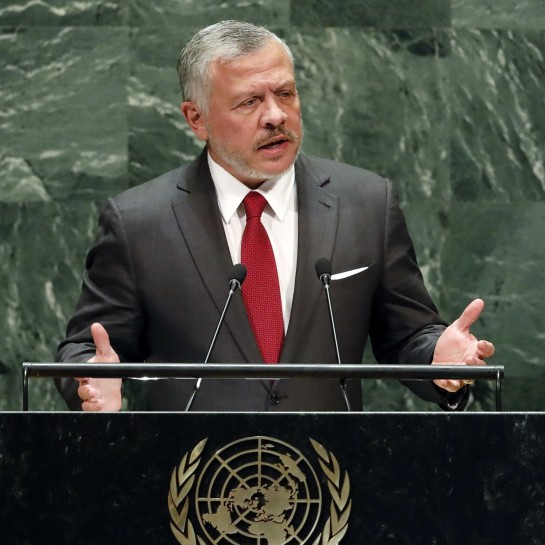One of the greater concerns over Israel’s application of sovereignty to the Jordan Valley is that the move will undermine mutually beneficial Israeli-Jordanian cooperation. Jordan’s King Abdullah II has substantiated some of the worry, declaring earlier this year that if Israel follows through on its plans with respect to the Jordan Valley, it will result in a “massive” confrontation with the Hashemite Kingdom. Others have expressed the possibility that such a move on the part of the Israeli government would jeopardize the Israeli-Jordanian peace treaty.
Though applying Israeli sovereignty to the Jordan Valley poses some risk to Israel’s relations with Jordan, it is unlikely that Jordan will gain much from jeopardizing its productive partnerships with both Israel and the United States.
When discussing Israeli-Jordanian relations, it’s important to note that there is a sizeable gap between how Jordan postures itself publicly vis-a-vis Israel in order to placate its Palestinian population and how it conducts itself privately in its relations with the Jewish state. Jordan has benefited considerably from the fact it is one of just two Arab nations to maintain diplomatic relations with Israel.
Cooperation between Jordan and Israel was formalized in a peace treaty just over 25 years ago. However, as a consequence of the treaty’s nod towards normalization, informal relations between the two powers have become particularly poignant within the military, intelligence, and economic realms.
Indeed, on an informal level, Jordan benefits substantially from the Israeli Defense Forces’ presence in the Jordan Valley, a condition that would only be solidified by Israel’s application of sovereignty. Israeli security forces undoubtedly stop terrorists and weaponry from reaching Islamist terror cells in parts of Jordan’s former West Bank which remain under the auspices of the Palestinian Authority. Indeed, Jordan’s “Black September” in 1970, in which Syrian-backed Palestinian militants known as fedayeen attacked the Hashemite monarchy, remains a testament to the unresolved tensions over the East Bank of the Jordan River. Indeed, permanent Israeli presence in the Jordan Valley would ensure one safe border for the Hashemite Kingdom, a benefit it certainly lacks on its Syrian and Iraqi frontiers.
Furthermore, the peace treaty, which some argue may be collateral damage, also ensures that the Hashemite kingdom maintains its religious foothold within the Arab world. King Abdullah II has benefited domestically from Jordan remaining custodian of Jerusalem’s Muslim and Christian holy sites, a position he has referred to as a “red line” for his country. It is unlikely Abdullah would grant the Palestinian cause primacy over Jordan’s custodianship over Muslim holy sites.
Jordan’s peace treaty with Israel allows for beneficial economic arrangements between the two nations, as well. In 2016, Jordan and a US-Israeli consortium signed a gas export contract which allows natural gas from Israel’s offshore natural gas field Leviathan to enter Jordan. The Jordanian government has stated previously that the contract is expected to result in at least $500 million annually in savings and that it may help decrease the government’s perennial budget deficit. In addition to natural gas, Israel also provides Jordan with water, to the tune of 50 million cubic meters per year.
If King Abdullah II were to elevate his anger over Israel’s application of sovereignty and walk away from the peace treaty, doing so could possibly complicate Jordan’s relationship with the U.S. Given the rise in regional threats, ranging from Iran to ISIS, remaining in the US-Israeli security fold is more critical than ever. In addition, the U.S. provides Jordan with not only stationed troops but somewhere between $1 billion and $2 billion in economic assistance every year. Such aid accounts for 18% of the Jordanian government’s revenue in 2020.
In short, from both an economic and security standpoint, Jordan cannot afford unstable relations with either Israel or the U.S. For all the concerns over Jordan’s reaction to Israel exercising sovereignty over the Jordan Valley, recalling what Jordan gains from normalization with Israel (and by extension, the U.S.) is important in assessing the Hashemite Kingdom’s enthusiasm for retaliatory measures. Indeed, even following the application of sovereignty, Jordan will depend on its relations with Israel, which include strategic benefits, natural resources, and a stable border for a kingdom all too familiar with jihadist rebels. In fact, the permanence of Israeli forces in the valley would undoubtedly strengthen the kingdom and further incentivize military cooperation with Israel, which has proven mutually beneficial for both Israel and Jordan in the long term.
Originally published in Washington Examiner

